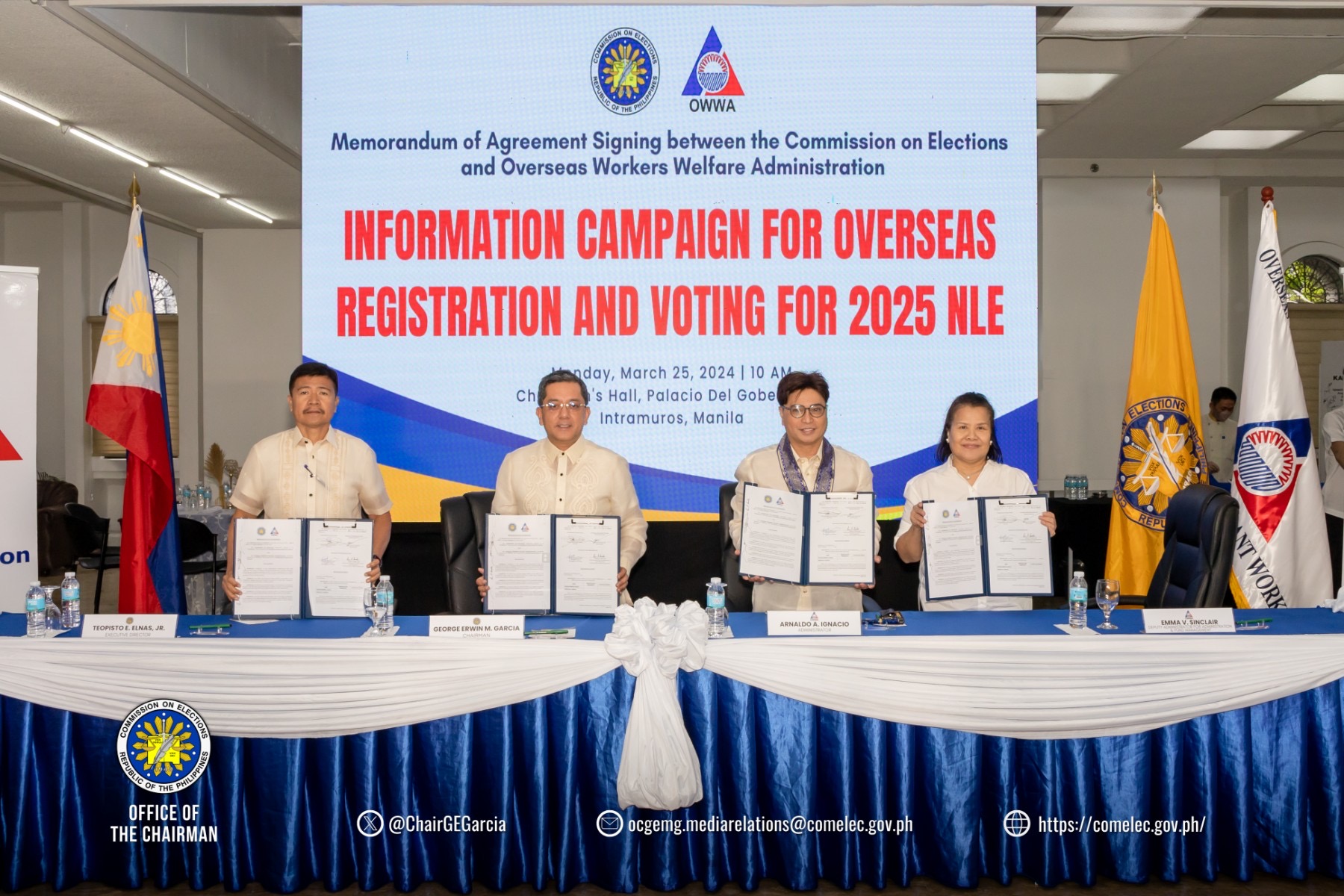MANILA, Philippines — The Commission on Elections (Comelec) on Monday inked a memorandum of agreement (MOA) with various organizations and a government agency for an information campaign on overseas voting.
This move, according to Comelec Chair George Erwin Garcia, is part of the poll body’s bid to increase the number of overseas voters for the 2025 midterm polls.
The Comelec’s Office for Overseas Voting signed the MOA with the Overseas Workers Welfare Administration (Owwa), the Fraternal Order of Eagles, Rotary International District 3810, and the Associated Marine Officers’ and Seamen’s Union of the Philippines (Amosup) at the poll agency’s office in Intramuros.
READ: When do we talk about online overseas voting?
In his message in front of members of the organizations, Garcia lamented the low count of voters among Filipinos abroad during the 2022 national elections.
The poll body’s chair said that only 1.697 million Filipinos registered to vote for the past election and among this figure, only 40.59 percent actually voted despite the Comelec sinking some P500 million into 2022’s registration campaign.
“This is the reality at present, that there are so many Filipinos abroad yet only a few are registering. We also do not know the answer to such a question,” Garcia said in a mix of Filipino and English.
This is why, he said, the Comelec approached organizations involved with Filipinos abroad to help in its drive to boost the number of overseas Filipino workers (OFWs) who will take part in next year’s national and local elections.
“Truly, the Commission on Elections alone cannot handle everything. I continue to emphasize this. The responsibility for elections is not solely that of the Comelec. It’s everyone’s responsibility. This is a call for assistance. We need the help of everyone,” Garcia noted.
He added that the poll body is targeting some three million overseas registrants for the 2025 elections.
Helping hands
During the MOA signing, Owwa administrator Arnel Ignacio called on OFWs to register and vote for next years’ polls.
“Let us show the world the strength of our democracy, the unity of our Filipino spirit, and the unwavering commitment we have to our nation,” Ignacio said.
Meanwhile, Rotary International District 3810’s District Governor, Lilian Dela Cruz, noted that her organization has ties with travel agencies which could assist the Comelec in its drive to increase the number of overseas voters.
“We will be involved in campaigning to encourage OFWs [to vote]. We are sure that our OFWs around the world will surely cast their votes,” Dela Cruz assured Comelec.
To further prod Filipinos abroad to vote, Garcia reiterated the convenience of internet voting, which was recently approved by the Comelec to increase voter turnout overseas.
Internet voting
“For the first time in our history, we will have internet voting. They (Filipinos overseas) can vote using only their devices. And so in our opinion, there is no longer any justification for them not to register,” he said.
READ: Comelec OKs online voting for overseas Filipinos in 2025 polls
This mode is in addition to the two ways of voting currently implemented for Filipino voters abroad, which are in person voting and voting by mail.
“Why are not so many overseas Filipinos voting personally or by mail? Maybe they need another mode,” Garcia said following the poll body’s meeting on the matter in May 2023.
But during Monday’s MOA signing ceremony, the Comelec chair explained that while internet voting is indeed convenient, there are some countries which would not allow the poll body to implement the scheme.
“I think there are eight countries which do not allow [to have] internet services like Russia, Israel, and China. In that case, because our compatriots won’t be able to vote using the internet, we would instead use our new machines. We would still deliver our machines to our embassies and consulates in the countries without internet services,” Garcia said.
He likewise quelled doubts that internet voting would lead to possible cheating during the elections, citing the use of voters’ biometric data to certify their identities, which Garcia said are also being used in e-wallet applications and mobile banking.
READ: Comelec: Still no bidders for overseas online voting system
“Why won’t we trust internet voting? It [uses] biometrics technology. We even pay using our cell phones now,” the Comelec chair said.
As for whether internet overseas voting would actually be viable, considering that a bidder is yet to come forward for an overseas online voting and counting system, Garcia expressed hope that the second round of bidding would turn out to be better than the previous one, where Comelec declared a failure of bidding.
The Comelec official noted that when internet voting becomes a success abroad, it would also be implemented in the Philippines for subsequent elections.
